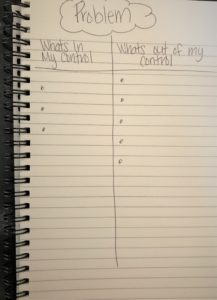We all have problems and issues that we face. They vary from huge, important life-changing problems to small issues that just grate on our nerves. Through my life, I’ve watched as some people share their problems freely while others keep a closed door on them. There are pros and cons to both I’ve found.
Sharing your problems with others will often be followed by a laundry list of suggestions and ideas to fix your problem. If you aren’t wanting advice, then either don’t share your problem with others or give your listener a heads up from the beginning that you just need to vent and don’t want opinions. It sounds odd, but it really will help strengthen that conversation.
As the listener, I will often ask… “Do you want my advice and suggestions or not?” Because I find most often, people don’t REALLY want to hear it, even when they say they do. Or as the listener, I won’t share my thoughts unless directly asked… this can be really difficult if you aren’t being intentional about it.
But if we NEVER share our problems with others, that load can become very heavy to bare on our own. Picking and choosing which issues you share, how you share them and to who with which you share them can really effect how you feel about the problem itself. So take some time to think about it before you start sharing.
If you’ve chosen to process through a problem on your own, here’s a quick and easy idea.
We’ve discussed previously how journaling can be therapeutic, especially in the face of adversity. Check out more information on that here.
Here’s another way to process through a problem by writing about it.

Start by writing down the main problem at the top of the page. Many times I find this to be very difficult to condense and through this process I realize the problem isn’t what I initially thought it was.
Then, make a t-chart under. The first column is a list of all the parts of this problem or solution that are IN YOUR CONTROL.
The second column are the things that aren’t in your control. This may be because they are in someone else’s control or just circumstances of life beyond anyone’s control.
At the bottom, make a goal of how you will focus on something in the first column of things you’re in control of. Maybe at this time, you realize you would like to share this part of the problem with someone you trust. The conversation will go much differently if you already have a goal of how you’re going to work through the problem before sharing it with someone. Now, you’re not seeking advice, you’re simply seeking support in executing your goal.
The best part of this exercise is that it really forces you to slow down and not make any rash decisions. When we are stressed and we feel out-of-control we often make decisions we wouldn’t otherwise make. Stop. Think. Write. Then Act.
Part of being Brave is going inside yourself and being intentionally reflective.
So Go Be Brave Friends!

Lena as always you are so timely. It’s interesting working with people daily who say they want advice but often just want to be heard and need to talk it through out loud to realize their own solutions. I always want to “fix” or “help” but have learned to shhhhhh and listen to see if they can figure it out themselves because if we do we are more likely to follow through with the solution. ❤️❤️